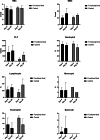Study of the Effect of Synbiotic Diet on Haematological and Oxidative Indexes Changes in Male Dogs
- PMID: 40028772
- PMCID: PMC11875068
- DOI: 10.1002/vms3.70290
Study of the Effect of Synbiotic Diet on Haematological and Oxidative Indexes Changes in Male Dogs
Abstract
Background: Synbiotic products are functional foods/feeds that contain both probiotic and prebiotic strains and have health-promoting effects beyond those of probiotics or prebiotics alone.
Objectives: This study aimed to investigate the effect of synbiotic feed containing the probiotic strain Lactobacillus acidophilus La5 (1012 cfu/g) and inulin (5%) on changes in haematological and oxidative serum indices in male dogs.
Methods: Twelve male dogs in two groups of six were included in the study. In addition to the basic feed, the dogs in the treatment group also received the synbiotic supplement at 5% in each of their three meals during 29 days. Then, on Day 0 and Day 29, the amount of malondialdehyde was measured based on thiobarbituric acid, and glutathione peroxidase activity and the amount of total serum antioxidants was also measured with the Randox kit; the obtained data were statistically analysed.
Results: The results showed that white blood cells increased (from 10.28 ± 2.89 to 16.48 ± 7.59 [p = 0.138]) and red blood cells decreased (from 6.492 ± 0.64 to 5.92 ± 1.14 [p = 0.461]) in the treatment group, but these changes were not significant. In the treatment group, it was found that synbiotic food has a significant effect on the increase of MCH (from 24.32 ± 0.93 to 26.30 ± 1.04 pg [p = 0.003]) and MCHC (from 33.24 ± 0.32 to 36.58 ± 0.72 g/dL [p < 0.001]), but it does not have a significant effect on the decrease or increase of other haematological factors. Also, significant reductions in the amount of malondialdehyde (from 3.2 ± 1.05 to 1.35 ± 1.05 µmol/L [p = 0.015]) and increases in the number of total serum antioxidants (from 0.27 ± 0.06 to 0.42 ± 0.09 mmol/L [p = 0.035]) were obtained in the treatment group.
Conclusion: It concluded that the consumption of synbiotic feed (L. acidophilus + inulin, at the rate of 5%) in male dogs may reduce and prevent oxidative stress, adjust side effects and prevent some disorders. In any case, many studies are needed to definitively prove these results.
Keywords: functional food; haematological parameters; oxidative stress; prebiotic; probiotic; synbiotic.
© 2025 The Author(s). Veterinary Medicine and Science published by John Wiley & Sons Ltd.
Conflict of interest statement
The authors declare no conflicts of interest.
Figures


Similar articles
-
Effects of synbiotic food consumption on metabolic status of diabetic patients: a double-blind randomized cross-over controlled clinical trial.Clin Nutr. 2014 Apr;33(2):198-203. doi: 10.1016/j.clnu.2013.05.015. Epub 2013 Jun 7. Clin Nutr. 2014. Retraction in: Clin Nutr. 2025 Aug 19:S0261-5614(25)00230-4. doi: 10.1016/j.clnu.2025.08.016. PMID: 23786900 Retracted. Clinical Trial.
-
The Effects of Different Level of Synbiotic Supplementation in Diet of Broiler on Growth Performance, Intestinal Histology and Microbial Colony.Arch Razi Inst. 2024 Dec 31;79(6):1227-1234. doi: 10.32592/ARI.2024.79.6.1227. eCollection 2024 Dec. Arch Razi Inst. 2024. PMID: 40599451 Free PMC article.
-
Evaluation of the efficacy of probiotic VSL#3 and synbiotic VSL#3 and yacon-based product in reducing oxidative stress and intestinal permeability in mice induced to colorectal carcinogenesis.J Food Sci. 2021 Apr;86(4):1448-1462. doi: 10.1111/1750-3841.15690. Epub 2021 Mar 24. J Food Sci. 2021. PMID: 33761141
-
Synbiotics, prebiotics and probiotics for solid organ transplant recipients.Cochrane Database Syst Rev. 2022 Sep 20;9(9):CD014804. doi: 10.1002/14651858.CD014804.pub2. Cochrane Database Syst Rev. 2022. PMID: 36126902 Free PMC article.
-
Home treatment for mental health problems: a systematic review.Health Technol Assess. 2001;5(15):1-139. doi: 10.3310/hta5150. Health Technol Assess. 2001. PMID: 11532236
References
-
- Adogony, V. , Respondek F., Biourge V., et al. 2007. “Effects of Dietary scFOS on Immunoglobulins in Colostrums and Milk of Bitches.” Journal of Animal Physiology and Animal Nutrition 91, no. 5‐6: 169–174. - PubMed
-
- Amin, M. , Jorfi M., Khosravi A., Samarbafzadeh A., and Sheikh A. F.. 2009. “Isolation and Identification of Lactobacillus casei and Lactobacillus plantarum From Plants by PCR and Detection of Their Antibacterial Activity.” Journal of Biological Sciences 9, no. 8: 810–814.
-
- Ansari, F. , Pashazadeh F., Nourollahi E., Hajebrahimi S., Munn Z., and Pourjafar H.. 2020. “A Systematic Review and Meta‐Analysis: The Effectiveness of Probiotics for Viral Gastroenteritis.” Current Pharmaceutical Biotechnology 21, no. 11: 1042–1051. - PubMed
MeSH terms
Substances
LinkOut - more resources
Full Text Sources

